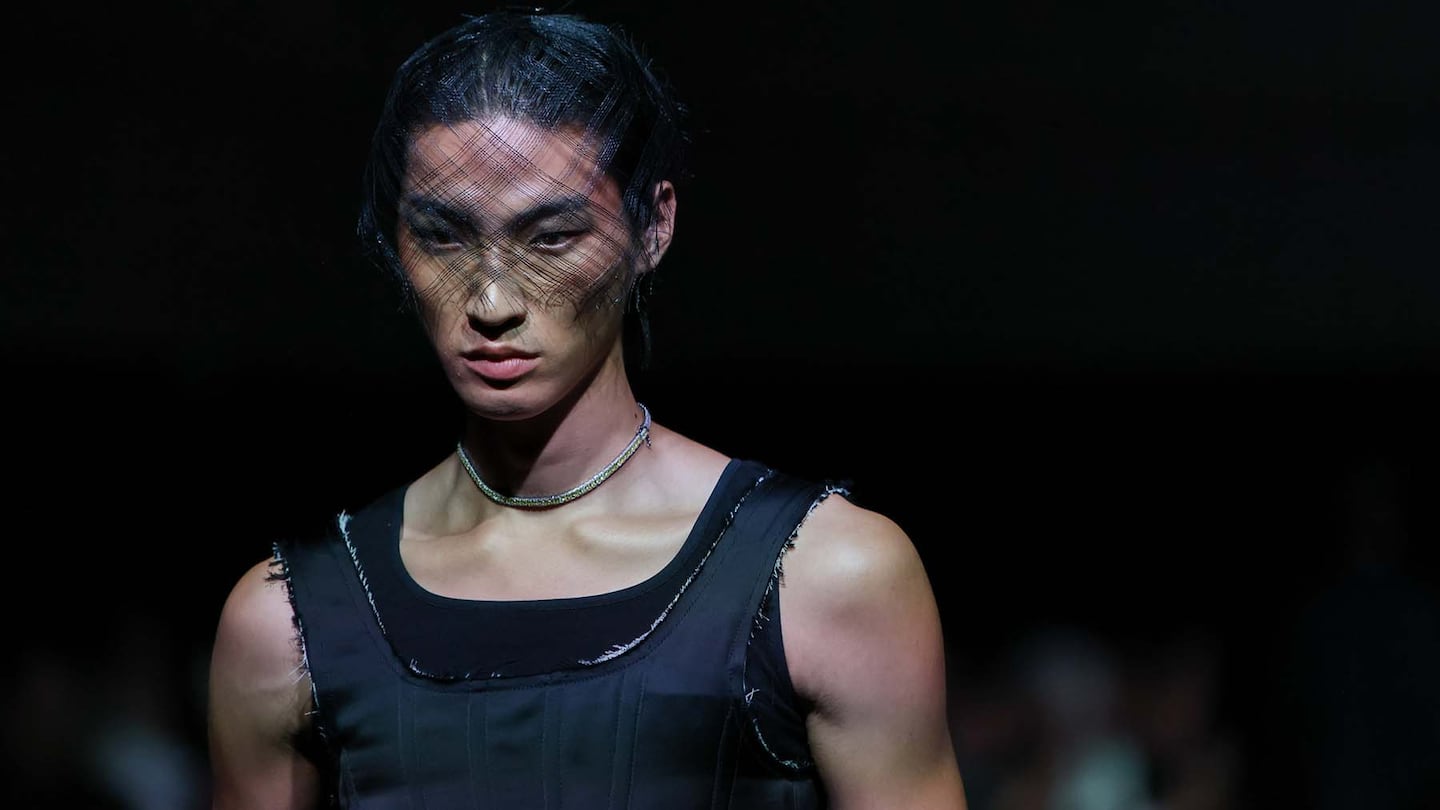
The Business of Fashion
Agenda-setting intelligence, analysis and advice for the global fashion community.

Agenda-setting intelligence, analysis and advice for the global fashion community.

The Daniel w. Fletcher show that opened London Fashion Week began on a muted note. There was a notable absence of street-style photographers as attendees formed an orderly queue outside the central London venue, and a minute’s silence was observed before the first model walked in an all-black suit. The show was accompanied by contemplative violin music, before ending on The Beach Boys’ cover of “California Dreamin’.”
The occasion struck a delicate balance between respect and commerce, which spoke to the resilience of the British fashion industry a week on from the death of Britain’s longest-serving monarch.
It almost didn’t happen.
The death of Queen Elizabeth II last week looked like it might upend dozens of designers’ plans for London Fashion Week. Within 24 hours of her death, Burberry and Raf Simons — whose presence on the schedule guaranteed greater attendance by international VIPs, buyers and editors than past seasons — cancelled their runway shows. The British Fashion Council issued a statement providing cover for designers who still wished to stage their shows, but urged them and the press to “respect the mood of the nation” by not publicising shows by distributing images to press or on social media — an essential aspect of coverage for any brand. One-by-one, big celebrations planned such as a Hugo Boss opening party to be hosted by Naomi Campbell and British boxer Anthony Joshua, were called off.
ADVERTISEMENT
“It was very unclear what the situation was, if it was even going ahead at that point,” said Fletcher, who is also the creative director of Italian heritage label Fiorucci. “The feeling was, with those two huge houses cancelling, that all the small brands would follow suit.”
On Friday, the BFC convened a conference call with the remaining designers on the schedule to weigh their options. Opinion was split: some felt London Fashion Week should be delayed or cancelled, either out of respect for the Queen or because Burberry’s withdrawal had robbed the week of much of its allure. There was also concern about a negative public reception if shows and events failed to strike a tone appropriate for the period of national mourning.
But many brands insisted they had to go on — they had invested more money than they could afford to lose, and stood to miss out on much more in wholesale orders, e-commerce sales and social media coverage if the shows were cancelled.
“We obviously panicked [on hearing the news] as there is so much preparation, stress and investment that goes into making a show happen,” said Charlotte Knowles, founder of London-based womenswear brand KNWLS. “A last-minute U-turn is really not an option.”
On Friday, opinion began to swing decisively toward pressing on. In a tweet, Bryanboy, a high-profile fashion blogger, ignited the conversation, stating: “I wonder how the young designers in London are gonna be financially impacted with the show cancellations. Let’s face it: putting together a fashion show costs a LOT of money. And many of them they don’t have it/financing [sic] out of pocket.”
Jonathan Anderson, returning for the first time since February 2020 and the biggest remaining name on the schedule, and a handful of other designers privately made the case to the BFC that moving ahead with shows was not only the right thing to do, but also essential for the long-term commercial viability of many of the brands. That had a rallying effect, and by the end of the call, most designers agreed to put on a united front, Fletcher said.
After the call, the BFC struck a different tone than it had on Thursday. Its new statement encouraged the industry “to support designers both in attendance of shows and in coverage of shows in the context of business, creativity, and the stories of the designers behind the businesses who have experienced a period of extreme adversity,” while acknowledging the “many new developing businesses that need access to international trade.”
Fashion week was officially back on, though the price of the disruption was high for some: Fletcher said he went back to his investor to help cover the cost of the show after a sponsor asked to postpone their contribution to his brand to a later date. Some designers, including Roksanda, a London mainstay since 2005, along with Estonian womenswear label Roberta Einer and Maxhosa, a South African knitwear brand, decided to postpone their shows or pull out altogether.
ADVERTISEMENT
Designers like Chet Lo, Emilia Wickstead and Christoper Kane, all scheduled to show Monday — the day of the Queen’s funeral — had to hastily arrange alternative dates, and hope and pray their models, makeup artists, event spaces and logistics support were still available.
Those days after the Queen’s death showed that for all the talk of fashion week being outdated, or only mattering as global marketing events for mega brands, these shows remain a vital step in the growth — and survival — of emerging brands.
London Fashion Week in particular is known as a showcase for emerging designers, many of whom stake the future of their businesses on how the collection they send down the runway is received. LVMH Prize winners Nensi Dojaka and SS Daley, as well as menswear designer Bianca Saunders, have all in recent years used London as a springboard for international recognition.
“There is a huge, huge financial pressure on young designers”, said Stavros Karelis, founder and buying director of luxury fashion retailer Machine-A. “They don’t get much financial support in the beginning, so they’re putting all their resources into this one moment that’s expected to translate to commercial success later on.”
In an Instagram post on Monday, Harris Reed said it was as important “now more than ever to support and be there for small brands in London this week,” after “speaking with my fellow young designers most of whom have put their entire brand budgets into their shows to bring in sales and brand awareness with the outcome being they are hopefully able to grow and not go under or have to restructure.”
It’s not so live-or-die for every brand on the schedule. But designers and experts say there are many reasons why they need to show.
Publicity is a big part of it — hence the pushback from designers after the BFC initially cautioned them not to post about their collections and for press not to publish images from the shows until after the official mourning period had ended.
“In 2022, the main source of marketing for a young brand is social media, to have international press is a huge opportunity that cannot be missed, especially with built-up investments towards this one moment that will define the next six months,” Knowles told BoF. “To have press not being able to share [on social media] would have been a complete nightmare — the show’s cultural success is what will drive the brand for the next six months.”
ADVERTISEMENT
The initial prospect of not being able to publicise its runway show was a factor in the decision made by Maxhosa to postpone its show, said Laduma Ngxokolo, founder of the 10-year-old brand. He said he plans to show his collection at a time when the industry is more focused on fashion.
“Online coverage from press and individuals at shows translates directly into sales for us,” he said.
The people in the room matter too: emerging brands hope to catch the eye of buyers who will stock their collections, and editors who will include their creations in photoshoots. For several years, many senior international buyers had skipped London Fashion Week after the disruption caused by Brexit and then the pandemic, combined with the fact that many bigger UK brands have opted to show in Milan or Paris. This time around, while two international buyers chose to skip London after Burberry pulled out, most are still in town for the week, people familiar with the matter say.
For many designers, cancelling a show so soon before the date therefore means incurring all of the cost and none of the payoff.
“We’ve invested so much money purely because we know this fashion week brings buyers, it brings future clientele … but that all wouldn’t happen if we’ve just spent all of this energy and money trying to make it happen and it falls apart,” said Chet Lo, who is set for his first solo runway show after three seasons showing through Lulu Kennedy’s brand incubator, Fashion East.
He added: “It was kind of like, if you at the end of the month have used up all your paycheck and you’re expecting another paycheck and it hasn’t arrived.”
Once they made the decision to press ahead, designers found themselves scrambling to rethink their shows, sometimes from the ground up.
Fletcher felt he’d scored a massive opportunity for his brand — Daniel w. Fletcher — to open London Fashion Week, but now found himself in the difficult position of also having to set the tone for an unprecedented week. He swapped out an upbeat ‘80s-heavy soundtrack for music by Max Richter, an English composer known for post-minimalist, classical work. The first look, the black-on-black morning suit, was a late addition to the show. Social posts will be “less about the VIPs in the front row and more about the caption,” he said.
“It’s still very much something that fits within the collection,” Fletcher said. “We’re not throwing a crown in there for the sake of it.”
Roberta Einer is one of many young designers who had planned celebratory comeback shows, but said that it no longer felt appropriate in light of the national period of mourning following the Queen’s death.
Others felt strongly about going ahead more or less as they had planned before last week. Lo described his show as “a little bit of craziness,” with a set — including an aromatic component — and custom music composed by a friend in Paris. After a few whirlwind days, he had arranged for everything to be moved from Monday to Tuesday. A concern for Lo is that many of the VIPs who were due to attend on the original date may not make the rescheduled show because they would be heading to Milan that day. (By contrast, Burberry announced it would now debut its collection on Oct. 26 — a brand of its size can guarantee a big international audience regardless of when it shows.)
But a show is not all about who’s in the front row, or the financial returns, he said.
“Ultimately, a show is kind of a physical piece of our emotions… it’s equally as important for us just in a creative artistic capacity that we have this outlet,” Lo said. “It’s very important for VIPs and buyers to be there but for me, emotionally, I just needed this outlet.”
Updates regarding the London Fashion Week schedule — which now falls during the national period of mourning in the United Kingdom following the death of Queen Elizabeth II — continue to be released.
Britain’s longest reigning monarch has died. Her influence extended to the realm of fashion, where she invented the concept of “sartorial diplomacy.”
London Fashion Week’s organisers recommended that brands cancel parties and hold off on releasing runway images until after Queen Elizabeth II’s funeral and national mourning.

Daniel-Yaw Miller is Senior Editorial Associate at The Business of Fashion. He is based in London and covers menswear, streetwear and sport.

Brian Baskin is Executive Editor at The Business of Fashion. He is based in New York and oversees BoF's beauty, retail, direct-to-consumer, technology, marketing and workplace verticals.
From where aspirational customers are spending to Kering’s challenges and Richemont’s fashion revival, BoF’s editor-in-chief shares key takeaways from conversations with industry insiders in London, Milan and Paris.
BoF editor-at-large Tim Blanks and Imran Amed, BoF founder and editor-in-chief, look back at the key moments of fashion month, from Seán McGirr’s debut at Alexander McQueen to Chemena Kamali’s first collection for Chloé.
Anthony Vaccarello staged a surprise show to launch a collection of gorgeously languid men’s tailoring, writes Tim Blanks.
BoF’s editors pick the best shows of the Autumn/Winter 2024 season.